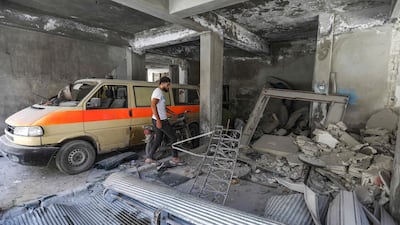The rise in airstrikes on schools and hospitals in Syria has led the UK to present an urgent draft resolution to the UN to tackle the crisis.
On Friday the UK urged member states to pass the resolution without a vote due to the "unjustifiable" human rights situation in Idlib.
It comes as four hospitals were hit during strikes on Wednesday.
Presently, 25 hospitals have been damaged and 49 have closed leaving 3m people with depleted access to health care.
Airstrikes have also seen 45 schools hit despite their coordinates having being shared.
Since April, shelling and air strikes have resulted in 350 deaths and the displacement of over 300,000 people.
The UK presented a draft resolution to the UN on Friday on behalf of a group of states, which also include France, Germany, Italy, Jordan, Kuwait, Morocco, the Netherlands, Qatar and Turkey.
It said: "The grave human rights situation continues to demand a response by this Council. This draft resolution reflects recent developments on the ground, which must be of concern to us all, including the ongoing crisis as a result of military action in Idlib.
"It is simply unjustifiable that 25 health facilities and 45 schools are reported to have been damaged due to airstrikes. And, in some cases these airstrikes took place despite the facilities sharing their coordinates with the UN deconfliction mechanism.
"As a result of these attacks, 49 health facilities have stopped or suspended all services, leaving the 3 million civilians in Idlib even more vulnerable."
It has raised concerns about the use of landmines by all parties, investigations into the use of chemical weapons and has urged for the need to search for missing people.
It added: "This text should be adopted without a vote being called. As we have said before, this resolution should enjoy the support of all at this Council.
"We urge all member states to put the plight of the Syrian people first, to support the UN-led political process under the auspices of the Special Envoy of the Secretary General, and adopt this text by consensus.
"In the event we must have a vote on this text, we urge all delegations to vote in favour of the text as drafted."
In May the UN's political chief Rosemary DiCarlo told an emergency meeting of the UN Security Council that the aerial bombardment is "alarming", including the use of barrel bombs on populated areas.
Medical facilities have special protections under the Geneva Conventions and international humanitarian law, and targeting them can be a war crime.
In May, Lynn Maalouf, Amnesty International’s Middle East Research Director, said: “Bombing hospitals carrying out their medical functions is a war crime. These attacks have eliminated vital lifelines for civilians in desperate need of medical care.
“This is part of a well-established pattern targeting medical facilities to systematically attack the civilian population and it constitutes crimes against humanity.
“We are urging Security Council members to do everything in their power to end the onslaught against civilians in Idlib and hold the perpetrators of these appalling crimes to account.”
Last September, a deal was struck with the assistance of Russia and Turkey to make Idlib a "de-escalation" zone.
The area is now largely controlled by Hayat Tahrir al-Sham, a UN-listed terrorist group that has links to al-Qaida.


